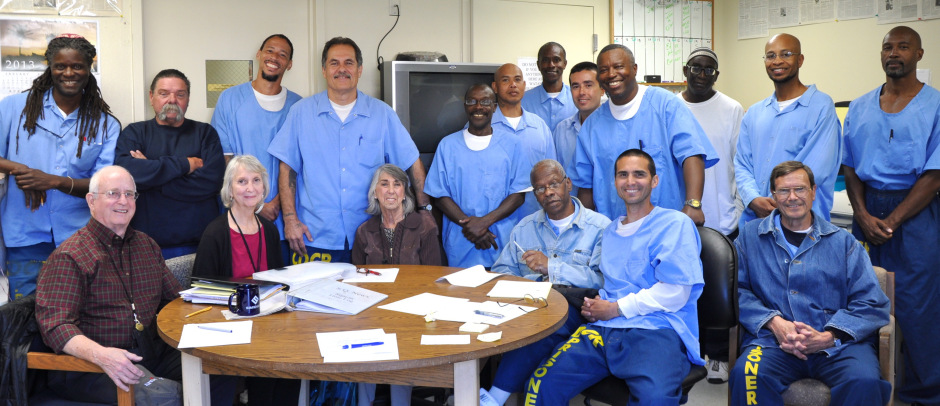Recently, District Attorney, Jeff Rosen paid a visit to San Quentin to discuss crime, punishment, rehabilitation, and reentry with about a dozen convicted murderers as part of the fourth San Quentin News Forum. “It isn’t very often that I’m in a room with a lot of guys who’ve committed serious crimes,” he said. He came because someone gave him a copy of the San Quentin News and he was impressed by it.
The forum exists so that prisoners and public safety officials can exchange ideas with the purpose of educating each other about some of the roughest problems related to incarceration, rehabilitation and reentry. It was the second time a Bay Area district attorney ventured inside San Quentin to discuss criminal justice policy with inmates.
“I agree that a lot of people don’t know about what happens in prison, and I’m one of them,” Rosen said. “I didn’t give much thought to what happens to defendants after they are convicted.”
The meeting began with the inmates introducing themselves to Rosen by stating their crime, sentence, and county in which they were convicted.
Rosen invited the inmates to give their opinion on what prison programs are most effective for rehabilitating offenders.
“Some of the programs that have helped me are Criminal and Gangs Members Anonymous; they show you the culture of what appeals to us in that cycle of violence,” said Miguel Quezada, 32. Quezada is in his 16th year of a 45 year-to-life sentence for second-degree murder.
Jorge Heredia, 39, sentenced to 13 years plus life for first-degree attempted murder, talked about several programs he’s taken. Heredia enrolled in the prison’s college program, called Prison University Project He is also involved in Victims Offender Education Group, San Quentin Inmate Resources Education Studies, Guiding Rage Into Power, and The Last Mile, a program that teaches inmates how to turn socially responsible ideas into a business model.
“We’re all trying to find ways to give back. These programs help me,” said Heredia who has been incarcerated for 16 years.
“For me No More Tears and the community-based group, Healing Circle opportunity to meet Paulette Brown,” said Samuel Hearnes, 36, referring to the mother of the man he was convicted of murdering in 1997. “She told me the story of her son and his murder. She did this and broke down in tears. When I saw that, it helped me take accountability for what I had done.”
“These programs teach us that we can and should take responsibility,” said Dave Bask, who has recently been found suitable for parole after serving more than 20 years behind bars for murder. “I was a racist but when I got into Patten University and watched what black men have through, I seriously gained empathy.” Basile has been found suitable for parole and is scheduled to be released sometime in May.
“I’m not sure how long race has been an issue, said Walter Spraeka, 54. In 1995. Spraefca was convicted of residential burglary and is serving a sentence of 37 years to life under the Three Strikes law.
“It’s more relaxed in San Quentin,” said Emile DeWeaver, 34, “But the race issue still exists here.” De Weaver is serving a sentence of 67 years to life and has been imprisoned since 1998.
Rosen then talked about why he wanted to become the District Attorney of Santa Clara County and said that after his predecessors ended the Innocence Project, he felt the office lost some of its credibility and accountability. So he founded the Conviction Integrity Unit (CIU), which examines practices in the district attorney’s office and the police departments with the intent to “vigorously pursue justice.”
Regarding Santa Clara County reentry services, Rosen said, “I’m lucky I work in a County that devotes resources to reentry. We have a resource re-entrv center. It’s about 500 yards from the District Attorney’s office. It’s a one-stop place for classes, training, and how to get medical services.”
Aly Tamboura said he wanted to give back to his community by talking to people about taking the right path in life.
“On the one hand I think it’s helpful for you to talk with high school students. On the other hand I want to be careful that we don’t glorify things,” Rosen told Tamboura. “I think a better audience for you might be other inmates or kids who are already going down that path, perhaps juveniles. I believe in second chances and change.”
Sean Webby, Rosen’s Public Communications Officer, once a reporter for the San Jose Mercury News and The Gazette in New York City, said, “I’m proud to be a journalist,” then turning to San Quentin News reporters continued, “I’m proud to be sitting here amongst you. We’re a brotherhood. You get into journalism to get to the truth.”









